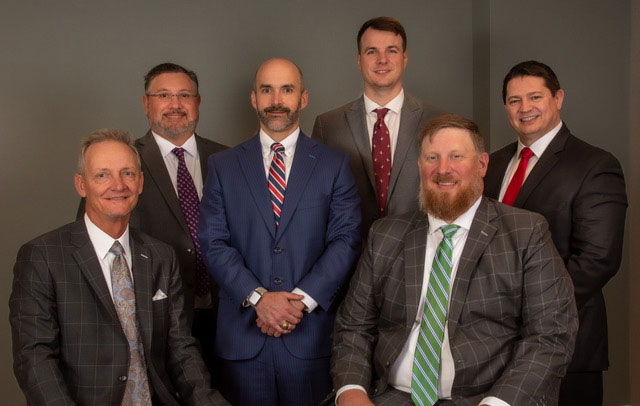
Columbia Workers’ Compensation Attorneys Representing Injured South Carolina Workers
On-the-job injuries and illnesses not only make it difficult to do your job. They often lead to mounting medical bills and time off work that can cause extreme financial hardship and stress.
If you’ve been injured on the job in South Carolina, you’re likely entitled to workers’ compensation benefits to cover your medical expenses and lost wages, but unfortunately, many workers are wrongfully denied these benefits or are offered far less than they actually deserve.
At Smith, Born, Leventis, Taylor & Vega, we believe that every employee is entitled to a safe workplace environment.
When on-the-job accidents or injuries do occur, you shouldn’t have to worry about how you’re going to afford your medical care or pay your bills.
Our team of experienced workers’ compensation attorneys is here to help protect your rights and ensure you get maximum compensation after a work injury or illness.

Client reviews
Very caring and hard-working and very respectful. They always resolve your problem as soon as you call.
I will tell everyone about them. If you need a workmans’ comp lawyer, please use them. You won’t regret it, thank you for everything.
Tonya
My team (Daniel Vega & Kim Spicer) were top-notch! They are professional and knowledgeable and I was always treated with respect. When my case took a hit from the doctor’s final impairment rating, Danny didn’t give up – he went full force and earned me a fair settlement! Kim is also a super star – responsive in getting the answers to all of my questions and handling a lot of the behind-the-scenes work.
You can’t ask for a better team to handle your case!
Trina
I injured my shoulder while working and was relying on my job to take care of me. After surgery and returning to work, I was experiencing pain. My job dismissed any responsibility and put all liability on their worker’s comp insurance. After 4 years of loyal employment, I felt mistreated and not valued. Not being completely healed, I then slipped, fell and injured myself again. My entire right side from neck, back, hip, and all the way down my leg. Needless to say, that didn’t sit well with the worker’s comp insurance company and more so, my job was no help. I became depressed and overwhelmed.
George Taylor not only became my voice and strength, he was a comfort through my storm. He treated me like a member of his family. George kept me informed and gave loving advice all the way through. I could call him when I needed. He recognized my personal, mental and physical struggles. You can trust in him. GOD knew EXACTLY what he was doing when he made him. I TOTALLY and HIGHLY recommend him and this firm. I’m VERY, VERY happy with my results.
Moses
Who pays for workers’ comp insurance?
By law, most South Carolina employers with 4 or more employees (full- or part-time) must carry workers’ compensation insurance. The employer pays premiums on the policy, and the South Carolina Workers’ Compensation Commission oversees the program.
Workers’ compensation insurance is a form of no-fault insurance, which means that a worker doesn’t have to prove their employer was at fault for their injury or illness to get workers’ comp benefits.
In most cases, a worker only needs to prove that their injury or illness occurred at work or resulted from their work environment.
What benefits are injured workers entitled to?
In South Carolina, employees who become injured on the job can receive the following types of benefits:
- Medical benefits. These cover all reasonable and necessary medical expenses related to a work injury, such as doctor visits, surgery, hospital stays, medication and rehabilitation.
- Wage replacement benefits. Workers are entitled to two-thirds of their average weekly wage if they cannot work because of a work injury or illness. They may receive this benefit temporarily or permanently.
- Permanent disability benefits. Injured workers who sustain permanent disability due to a work-related injury or illness may receive permanent disability benefits. The worker’s wages before the injury, the injury’s severity, and other factors determine the amount of disability payments.
- Death benefits. If a worker dies because of a work injury, their dependents are entitled to benefits to cover funeral expenses, medical bills and lost income.
What types of injuries are covered under workers’ comp?
Workers’ comp insurance includes coverage for a wide range of work-related injuries and illnesses, although benefits vary based on the circumstances. Generally, workers can receive coverage for:
- Accidents. Injuries that occur on the job from accidents such as slip-and-fall accidents, motor vehicle accidents, forklift accidents and other accidents are covered under workers’ compensation.
- Repetitive stress injuries. Injuries that result from repetitive activities or motions at work and occur over time, such as carpal tunnel syndrome and tendonitis, are also covered under workers’ comp.
- Occupational illnesses. Illnesses that stem from workplace exposure to harmful conditions or substances, such as cancer, hearing loss and asthma, are also covered.
- Pre-existing conditions. If work-related activities worsen or exacerbate a pre-existing condition, workers may be able to receive coverage for a pre-existing condition as well.
What steps do I need to take after a work injury?
Just because your injury or illness qualifies for workers’ comp benefits in South Carolina doesn’t mean you’ll automatically get compensation. It’s crucial that you follow the necessary steps to protect your rights after any work injury:
- Seek medical attention and inform the medical provider that your injury occurred at work. This documentation is crucial for proving that your injury is work-related.
- Report the injury to your supervisor as soon as possible to ensure your claim gets filed within the required time limits. In South Carolina, if you don’t report your injury within 90 days, you likely won’t be able to recover any compensation.
- After receiving notification of your injury, your employer is required to file your claim with the South Carolina Workers’ Compensation Commission.
- You should seek legal help from a workers’ comp attorney, especially if you have severe injuries, a complex case involving pre-existing injuries, or your claim is denied.
Insider insights: What you need to know to expedite your workers’ comp claim

The most frequent question I encounter as a workers’ compensation attorney is: ‘Why has my claim taken so long?’
Many individuals head to work each day, expecting routine and safety, never anticipating that today might be the day they get hurt at work. Yet, when injury does occur, it can abruptly turn life topsy-turvy.
Common reasons workers’ comp claims get denied
Workers’ comp insurers can be aggressive about denying claims, so don’t give up if your claim is initially denied.
Some common reasons claims get rejected include the following:
- Failing to report the injury or illness within the mandated reporting timeframe
- Reporting a non-work-related injury, such as an accident due to horseplay at work or an injury sustained while off the clock
- Failing to get medical treatment or documentation of treatment to support the need for compensation
- Failing to meet deadlines and other requirements for filing the claim
How do I appeal a denied claim?
If your work injury claim gets denied, you can request a hearing with the South Carolina Workers’ Compensation Commission (SCWCC) to appeal, but be aware that the process is often complex and time-consuming. Consider working with an experienced workers’ compensation attorney who can guide you and advocate for your best interests.
The approach to appeal a denial starts with reviewing the reasons for the denial in the letter you receive. After requesting a hearing, you must complete Form 50 and submit it to the SCWCC. You should then secure additional evidence to support your claim.
After the hearing, you will receive a written decision letter from the court and benefits if successful. If your claim is still denied, you can continue your appeal to the circuit court and the South Carolina Supreme Court if necessary.
When should I hire a workers’ comp attorney?
You may need to hire an attorney if your claim gets denied or your employer disputes your injury or illness is work-related. You may also need legal assistance if your injuries are severe and you need ongoing treatment, you have a permanent disability, or you have pre-existing injuries that complicate the situation.
What if a third party, such as a contractor or product manufacturer, caused my injury? Can I still file a workers’ compensation claim?
If a 3rd party (someone other than your employer) contributed to your work-related injury, you might be eligible to file a personal injury lawsuit against that third party in addition to a workers’ comp claim. In a personal injury lawsuit against a 3rd party, you may be able to recover additional compensation beyond what you might receive from workers’ comp, including damages for pain and suffering.
Our Columbia workers’ compensation attorney can help determine which parties may be liable for your injuries and help you recover maximum compensation.
FAQs about workers’ compensation claims
In most cases, your doctor visits, hospital stays, medication and other necessary medical treatments are paid by your employer’s workers’ comp insurance. In South Carolina, you must use a doctor approved by your employer or risk not being reimbursed for your expenses.
In South Carolina, you must ask your employer which doctor to visit. If you receive a referral from the hospital, check with your employer before making an appointment to see if they will approve the doctor and cover the expenses.
You can leave your job while receiving workers’ comp benefits. However, quitting may impact the benefits you receive for your work-related injury, causing them to stop abruptly. It’s best to speak with an attorney to discuss your options before quitting your job.
While your employer can’t legally fire you for filing a workers’ compensation claim, they could potentially fire you for other reasons while you’re receiving workers’ comp benefits.
Even in cases where your employer has the legal right to fire you, you’ll retain your right to workers’ comp benefits, regardless of the reason for your termination.
If you’re fired, you may have some negative consequences on your case, so working with a workers’ compensation attorney is essential to understand your rights.
Workers’ comp insurance does not provide coverage for emotional distress or pain and suffering. However, if the pain of your physical injury leads to a mental illness such as depression, you may be able to receive coverage for the treatment of such conditions. If your injury has healed, but you still suffer debilitating pain and cannot work, you may qualify for permanent partial disability benefits.
If your doctor writes a note requiring you to be completely off work for more than 14 days, you can receive benefits beginning the first day you cannot work. The timeline will vary based on how many days your doctor says you must stay completely off of work.
If your note states a temporary work absence of more than 7 days but less than 14, you can receive benefits starting on the 8th day. The severity of your injuries and your doctor’s recommendation affect the timeline.
Speaking to an attorney before accepting a settlement can ensure that you get enough compensation to take care of your current and future medical expenses.
A lump-sum payment may sound attractive, but an attorney experienced in workers’ comp cases can help you project future costs and compare the full compensation you are entitled to against the offered settlement and negotiate the best outcome.
Be aware that if you accept an offer and you find out later that your injuries are more substantial and require more treatment than you originally thought, you won’t be able to go back and request more compensation later.
Give your doctor’s note to your employer and keep a copy for your records.
If your doctor decides that you should be completely off work for more than 7 days but less than 14, you’ll receive temporary compensation for your lost wages on the 8th day.
If your doctor decides that you should be off work for more than 14 days, you will receive compensation benefits beginning on your first day of becoming incapacitated.
If your doctor decides that you should return to work with limited capacity while you heal, you can receive compensation for the difference in your wages pre-injury versus post-injury.
If you’ve been issued restrictions for light-duty work, you must accept the job if it falls within your restricted abilities. You have a right to a workers’ comp hearing if you feel the work is outside of your capability, but if you do not accept the assignment, you may lose all compensation as long as you don’t work.
If you’ve been offered light-duty work that you don’t feel is actually light-duty, you should discuss the situation with an experienced workers’ compensation attorney to ensure your rights and your health are protected.
Yes, you can receive reimbursement for travel to and from medical treatment for a work-related injury. If your trips to and from medical care or the pharmacy exceed 10 miles round trip, you can get reimbursed at the rate state employees receive for mileage.
Get a free consultation with our Columbia workers’ compensation attorneys
While it was originally designed to be a simple and convenient way for workers to get compensation after an on-the-job injury or illness, the workers’ compensation claim process can be complicated and full of pitfalls.
Most South Carolina workers are entitled to compensation after a work-related injury or illness, but unfortunately, legitimate claims are wrongfully denied every single day.
At Smith, Born, Leventis, Taylor & Vega, our team will fight for your rights and handle every aspect of your claim, so you can focus on your recovery.
Contact us today to schedule your first free consultation and learn more about how we can help you get the justice and compensation you deserve.
Explore these in-depth articles on various aspects of workers’ compensation, including the types of benefits, eligibility criteria, and dealing with claims denial.
Remember, workplace safety is crucial in preventing work-related injuries and illnesses, so always prioritize your well-being and the well-being of your coworkers.
